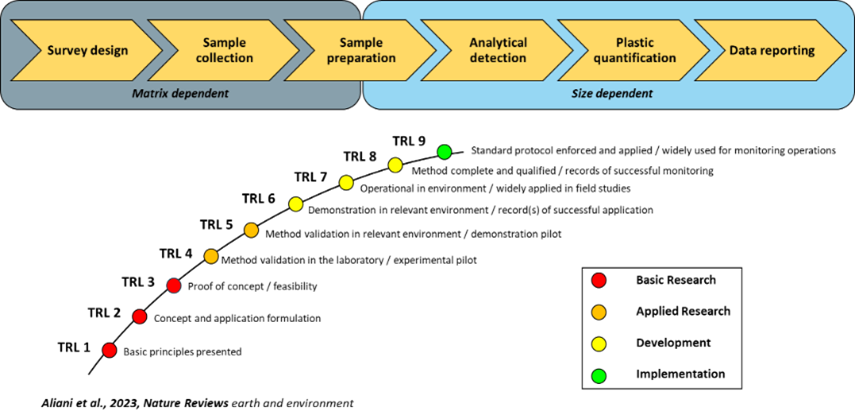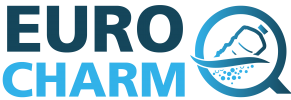General EUROqCHARM in a nutshell: impacts and results
EUROpean quality Controlled Harmonization Assuring Reproducible Monitoring and assessment of plastic pollution (EUROqCHARM)
Plastic pollution has become a global environmental and societal concern in recent years. Numerous protocols have been developed to monitor plastic debris, but these are rarely comparable. This has hindered the gathering of knowledge regarding pollution sources, the development of monitoring programmes and risk assessments, and the implementation of mitigation measures.
EUROqCHARM has addressed this by critically reviewing state-of-the-art analytical methods and, taking harmonisation one step further by validating them through an interlaboratory comparison (ILC) study. This has brought together key European laboratories and generated capacity for the analysis of plastic pollution in environmental samples. In addition, reference materials were produced to be marketed for at least three of the four target matrices (water, soil/sediment, biota) during and after the project’s completion. EUROqCHARM has ensured project outputs were discussed during the ratification of monitoring guidelines on national, regional, and international levels, and supported the capacity building in Europe. Furthermore, EUROqCHARM has made some major breakthroughs to support the EU’s Green Deal, particularly the Zero Pollution Action Plan and the Plastic Strategy, including implementing several directives.
- EUROqCHARM has established the technical readiness of existing methods to measure plastic pollution.
EUROqCHARM has systematically assessed and highlighted the state-of-the-art of methods to measure macro to nano plastic litter in environmental samples. Here, EUROqCHARM has developed a new concept to assess current methodologies by establishing ‘reproducible analytical pipelines’ (RAPs) which cover all elements of the analytical chain. Each element in a RAP was then assessed in terms of the Technological Readiness Level (TRL) using a SWOT approach to establish the readiness of methods for international monitoring or the needs for further research and development. This approach has drawn much attention from the international community and the TRL output is currently being implemented in working groups to further standardise methods, especially for microplastics.
- EUROqCHARM has taken the lead in producing reference materials for microplastic analysis.
EUROqCHARM has developed a new concept to make and use reference materials containing low but environmentally realistic levels of microplastic. The microplastics are imbedded in a soda tablet which is easy to dissolve in analytical laboratories, and can be used for method development and quality control. The tablets were successfully used in an interlaboratory comparison study with more than 60 participants. Tablets containing different concentrations and different polymers will become commercially available through the project’s SME partner (Chiron AS).
- EUROqCHARM, in collaboration with the NORMAN network and QUASIMEME, has organised a large-scale interlaboratory comparison study for the analysis of microplastic in environmental samples.
EUROqCHARM has organised one of the largest interlaboratory comparison studies on the analysis of microplastic in soda tablets for (water), sediment, and sand samples. The results of the different laboratories varied considerably, especially for the more complex samples (sediment, sand). This work will continue through the NORMAN Network and QUASIMEME to further assure the quality of the analysis of microplastics in environmental matrices.
- EUROqCHARM has worked closely with standardisation organisations (ISO/CEN) and monitoring initiatives (within MSFD-TGML, OSPAR, ICES, AMAP) to harmonise methods for plastic litter.
EUROqCHARM has contributed to the development of the ISO/CEN standard for the analysis of microplastic in drinking water and surface water with low content of organic material. EUROqCHARM soda tablet reference materials will be used for the method validation for microplastic > 50 µm. EUROqCHARM has also actively taken part in discussions with the Technical Working Group on Marine Litter (TGML) on the revision of guidelines for monitoring plastic litter within the Marine Strategy Framework Directive (MSFD). The work of EUROqCHARM will also support other Directives as part of the EU’s Green Deal including the Urban Waste Water Treatment Directive (UWWTD), the Sewage Sludge Directive (SSD), the Environmental Quality Standards Directive (EQSD), and the upcoming recast of the Drinking Water Directive (DWD) in the beginning of 2024. Furthermore, EUROqCHARM partners have been actively engaged in the working groups of OSPAR, ICES, AMAP, SCOR, and the Ministry of Environment Japan to support regional and international harmonisation efforts. EUROqCHARM also supports the need for an Integrated Marine Debris Observing System (IMDOS). - EUROqCHARM worked closely with EMODNet to harmonise the reporting of plastic litter data.
EUROqCHARM worked closely with EMODNet on the harmonisation of reporting of litter including micro to macro plastic litter through EUROqCHARM partner OGS and a workshop discussing this issue. The workshop was online with more than 50 stakeholders participating. In addition, EUROqCHARM has been represented at combined workshops through EMODNet and ICES to synchronise reporting on an international level. These activities have been closely linked to IMDOS. - EUROqCHARM has put significant effort into capacity building through online and in-person workshops.
EUROqCHARM has organised several capacity-building events including a workshop with participants of the interlaboratory study. Here, laboratories exchanged information with facilitation by EUROqCHARM partners. For the laboratories unable to attend, online capacity-building events were organised to support further harmonisation and the quality of analysis. In regions with less capacity, more specifically around the Black Sea, hands-on training was carried out summer of 2023 with participation from instrument makers.
- EUROqCHARM has focussed on effective and impactful communication of the outcomes generated by the project through a wide variety of platforms.
EUROqCHARM has been very active in the communication of project activities and results. The main platform for communication is the project’s website, which has been updated continuously to ensure timely announcements of the project’s achievements. X/Twitter (@EUROqCHARM) has been a social media platform that allows for more targeted promotion of the project’s progress with more detailed updates regularly provided every six months through our Newsletter. EUROqCHARM also hosts a Zenodo community on “Plastic pollution assessment and monitoring” for effective and systematic dissemination of project outputs. The Zenodo community has also been made available to our audience as a repository for other harmonisation and standardisation relevant content. Our project partners, from our last count, led and contributed to over 15 peer-review publications and presented the project outputs at several international conferences and workshops. EUROqCHARM also hosted online webinars and workshops, a stakeholder event during SETAC Europe’s 32nd Annual Meeting (May 2022), during the project’s 2nd Annual Meeting in Amsterdam (September 2022), and during the EUROqCHARM Final Conference in Brussels October 2023.
